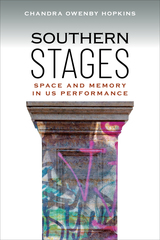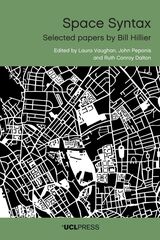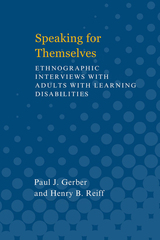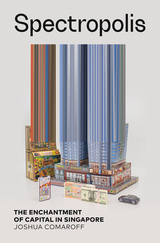5 books about North, John
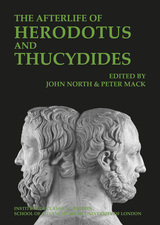
The Afterlife of Herodotus and Thucydides
Edited by John North and Peter Mack
University of London Press, 2019
This is one of the volumes in the series of ‘Afterlives’ of the Classics, which is being produced jointly by the Institute of Classical Studies and the Warburg Institute.
[more]

The afterlife of Ovid
Edited by Peter Mack and John North
University of London Press, 2015
Ovid was the most influential and widely imitated of all classical Latin poets. This volume publishes papers delivered at a conference on the Reception of Ovid in March 2013, jointly organised by the Institute of Classical Studies and the Warburg Institute, University of London. It presents studies of the impact of Ovid’s work on Renaissance commentators, on neo-Latin poetry and epistolography, on Renaissance engravers, on poets like Dante, Mantuan, Pontano, Ariosto, Tasso, Spenser, Lodge, Weever, Milton and Cowley and on artists including Correggio and Rubens. The main focus of the volume is inevitably the afterlife of the Metamorphoses but it also includes discussions of the impact of Heroides, Fasti, and Ibis, and publishes for the first time a Latin verse life of Ovid composed around 1460 by Bernardo Moretti. Contributors are Hélène Casanova-Robin, Frank T. Coulson, Fátima Diez-Plazas, Ingo Gildenhard, Philip Hardie, Maggie Kilgour, Gesine Manuwald, Elizabeth McGrath, John Miller, Victoria Moul, Caroline Stark, and Hérica Valladares.
[more]

The Afterlife of Plutarch
Edited by John North and Peter Mack
University of London Press, 2018
Plutarch’s writings have had a varied reception history from when he was writing in the second century BCE down to today. This volume starts from what may be a translation into the Syriac dialect of a lost Plutarch essay; continues with a tribute from a leading scholar of the later Byzantine period; and follows the centuries of sustained enthusiasm from the Renaissance to the eighteenth century. This period started once a translation into Latin had become available, and ended when scholars in the nineteenth century lowered Plutarch’s reputation as historian, biographer, philosopher, and stylist. By the end of the century, he came to symbolize in the eyes of Tolstoy precisely what history should not be. Both the causes of the decline and the later recovery of interest raise important new questions about how Plutarch should be assessed in the twenty-first century. This is one of the early volumes in the series of ‘Afterlives’ of the Classics, being produced jointly by the Institute of Classical Studies and the Warburg.
[more]

The Afterlife of Virgil
Edited by P Mack and John North
University of London Press, 2017
Virgil has always been copied, studied, imitated, and revered as perhaps the greatest poet of the Latin language. He has been centrally important to the transmission of the classical tradition, and has played a unique role in European education. In recognition of the richness of his reception the fourth conferences in the joint Warburg Institute and Institute of Classical Studies series on the afterlife of the Classics was devoted to the afterlife of Virgil. This volume focuses on the reception of the Eclogues and the Aeneid in three main areas: Italian Renaissance poetry, scholarship and visual art; English responses to Virgil’s poetry; and emerging literatures in Eastern Europe in the seventeenth and eighteenth centuries. Contributors are Giulia Perucchi, M. Elisabeth Schwab, Clementina Marsico, David Quint, Marilena Caciorgna, Maté Vince, Hanna Paulouskaya, Tim Markey, Charles Martindale, and Francesca Bortoletti.
[more]
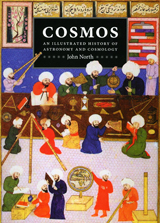
Cosmos
An Illustrated History of Astronomy and Cosmology
John North
University of Chicago Press, 2008
For millennia humans have studied the skies to help them grow crops, navigate the seas, and earn favor from their gods. We still look to the stars today for answers to fundamental questions: How did the universe begin? Will it end, and if so, how? What is our place within it? John North has been examining such questions for decades. In Cosmos, he offers a sweeping historical survey of the two sciences that help define our place in the universe: astronomy and cosmology.
Organizing his history chronologically, North begins by examining Paleolithic cave drawings that clearly chart the phases of the moon. He then investigates scientific practices in the early civilizations of Egypt, Greece, China, and the Americas (among others), whose inhabitants developed sophisticated methods to record the movements of the planets and stars. Trade routes and religious movements, North notes, brought these ancient styles of scientific thinking to the attention of later astronomers, whose own theories—such as Copernicus’ planetary theory—led to the Scientific Revolution.
The work of master astronomers, including Ptolemy, Galileo, Kepler, and Newton, is described in detail, as are modern-day developments in astrophysics, such as the advent of radio astronomy, the brilliant innovations of Einstein, and the many recent discoveries brought about with the help of the Hubble telescope. This new edition brings North’s seminal book right up to the present day, as North takes a closer look at last year’s reclassification of Pluto as a “dwarf” planet and gives a thorough overview of current research.
With more than two hundred illustrations and a comprehensive bibliography, Cosmos is the definitive history of astronomy and cosmology. It is sure to find an eager audience among historians of science and astronomers alike.
Organizing his history chronologically, North begins by examining Paleolithic cave drawings that clearly chart the phases of the moon. He then investigates scientific practices in the early civilizations of Egypt, Greece, China, and the Americas (among others), whose inhabitants developed sophisticated methods to record the movements of the planets and stars. Trade routes and religious movements, North notes, brought these ancient styles of scientific thinking to the attention of later astronomers, whose own theories—such as Copernicus’ planetary theory—led to the Scientific Revolution.
The work of master astronomers, including Ptolemy, Galileo, Kepler, and Newton, is described in detail, as are modern-day developments in astrophysics, such as the advent of radio astronomy, the brilliant innovations of Einstein, and the many recent discoveries brought about with the help of the Hubble telescope. This new edition brings North’s seminal book right up to the present day, as North takes a closer look at last year’s reclassification of Pluto as a “dwarf” planet and gives a thorough overview of current research.
With more than two hundred illustrations and a comprehensive bibliography, Cosmos is the definitive history of astronomy and cosmology. It is sure to find an eager audience among historians of science and astronomers alike.
[more]
READERS
Browse our collection.
PUBLISHERS
See BiblioVault's publisher services.
STUDENT SERVICES
Files for college accessibility offices.
UChicago Accessibility Resources
home | accessibility | search | about | contact us
BiblioVault ® 2001 - 2025
The University of Chicago Press


